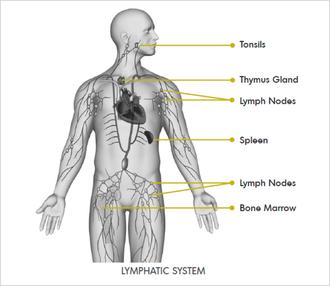Lymph is the fluid that circulates throughout the lymphatic system. It is formed when the interstitial fluid (the fluid which lies in the interstices of all body tissues) is collected through lymph capillaries. It is then transported through larger lymphatic vessels to lymph nodes, where it is cleaned by lymphocytes, before emptying ultimately into the right or the left subclavian vein, where it mixes back with the blood.
Since the lymph is derived from the interstitial fluid, its composition continually changes as the blood and the surrounding cells continually exchange substances with the interstitial fluid. It is generally similar to blood plasma, which is the fluid component of blood. Lymph returns proteins and excess interstitial fluid to the bloodstream. Lymph may pick up bacteria and bring them to lymph nodes, where they are destroyed. Metastaticcancer cells can also be transported via lymph. Lymph also transports fats from the digestive system (beginning in the lacteals) to the blood via chylomicrons.
The word lymph is derived from the name of the ancient Roman deity of fresh water, Lympha.
Razavi Khorasan Province, Mashhad, Khayyam Blvd No. 46
Prevention, care and treatment of lymphedema in organs following bone cancer, lymphoma and procto-therapy
+00989154402160
051-37668619
051-37602391
